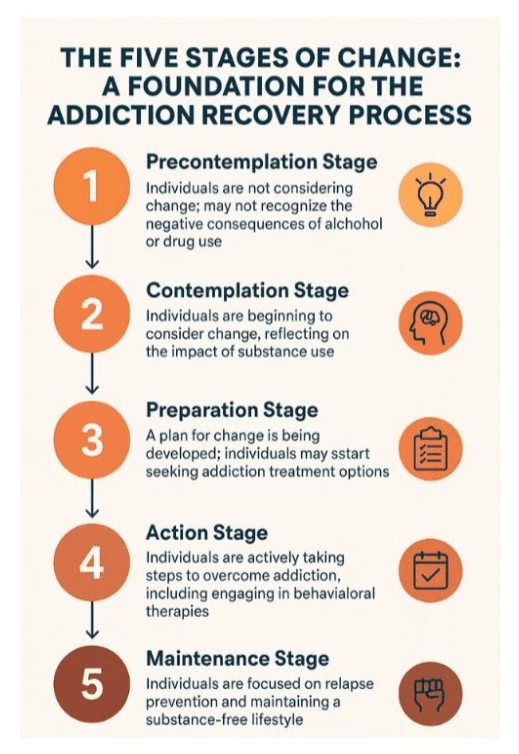Addiction is a chronic condition that affects millions of individuals and their families. Whether dealing with alcohol abuse, drug addiction, or another form of substance use disorder, understanding the stages of addiction recovery can help individuals and their support systems navigate the recovery process with greater clarity and confidence.
The Substance Abuse and Mental Health Services Administration (SAMHSA) and the National Institute on Drug Abuse (NIDA) both emphasize that recovery is not a one-size-fits-all process. It unfolds in stages, often modelled by the Transtheoretical Model or Stages of Change Model.

The Five Stages of Change Model: A Foundation for the Addiction Recovery Process
The addiction recovery process is not a straight line—it’s a winding road with progress, setbacks, and powerful lessons along the way. According to the Transtheoretical Model or Stages of Change Model, recovery unfolds in five distinct but fluid phases. It’s common for individuals to move back and forth between these stages, especially in the face of triggers, withdrawal symptoms, or life stressors.
For instance, someone firmly in the action stage may encounter difficulties, experience a relapse, and slide back into the contemplation stage before regaining momentum. This cyclical pattern doesn’t mean failure—it reflects the nature of chronic illnesses like substance use disorder, where long-term management, flexibility, and ongoing support are essential.
What matters most is the ability to resume treatment, stay engaged with mental health services, and lean on support groups or individual therapy when things get tough. Relapse can be a learning opportunity, not a dead end.
Here’s a breakdown of the five stages that form the foundation of the stages of addiction recovery:
1.) Precontemplation Stage
In the precontemplation stage, individuals are often unaware or in denial about the severity of their substance use. They might not recognize their alcohol or drug use as a problem, even if family members, coworkers, or healthcare providers express concern.
People in this stage tend to minimize the impact of their addictive behaviours, dismiss negative consequences, or blame external factors for their challenges. At this point, they are not considering professional treatment or making any immediate plans for change.
This stage may last days, months, or even years. The goal here is to gently raise awareness—through education, motivational interviewing, or informal conversations—so the person may move into the next stage.

2.) Contemplation Stage
In the contemplation stage, individuals begin to reflect more seriously on how drug use, alcohol abuse, or illicit drugs have affected their lives. They may recognize patterns of harm—such as strained relationships, financial struggles, or mental health issues—but still feel ambivalent about quitting.
They might think, “I know I have a problem, but I’m not sure I’m ready to give this up.” This internal conflict can be intense. Still, it represents a key turning point.
This is a pivotal moment where family members, addiction counsellors, or treatment specialists can help guide the individual toward the next stage through motivational support, gentle confrontation, or by sharing resources on treatment options and support groups.
3.) Preparation Stage
During the preparation stage, the individual has decided to change and is planning to take action soon, often within the next 30 days. They may be researching Riverside addiction treatment programs, exploring treatment centers, or talking to their doctor about medication-assisted treatment.
There’s often a sense of hope and urgency in this phase. People may begin to reduce their substance use, reach out for help, or inform loved ones of their decision. This stage is also a good time to address practical matters, such as arranging transportation to a treatment facility, organizing childcare, or preparing for time off work.
Proper planning during this stage increases the chances of a successful recovery and smooth transition into the action stage.
4.) Action Stage
The action stage is when the commitment becomes reality. Individuals take tangible steps to address their substance abuse, such as enrolling in a rehab program, participating in group therapy, or beginning behavioural therapies like CBT or DBT.
This stage often includes:
• Detoxification and managing withdrawal symptoms in a residential treatment program or outpatient service
• Learning and practicing new coping mechanisms
• Addressing co-occurring mental health conditions
• Engaging in individual therapy and support groups
• Building structure and avoiding high-risk situations
People in this stage are doing the hard work of change. They need encouragement, structure, and access to comprehensive care, including addiction medicine, peer support, and sometimes family involvement.

5.) Maintenance Stage
The maintenance stage is about sustaining the progress made during treatment and preventing relapse. This is often the longest phase in the addiction recovery process, and it requires continued dedication.
Key focus areas in this stage include:
• Participating in relapse prevention planning
• Maintaining ties with Alcoholics Anonymous or similar support groups
• Rebuilding trust with family members
• Establishing healthy habits, goals, and purpose
• Avoiding triggers and reinforcing new routines
The maintenance stage is also when individuals work on repairing relationship problems, pursuing education or career goals, and finding joy in substance-free living. It’s a phase of empowerment and reinvention—proof that recovery is not just about quitting, but about creating a life worth staying sober for.
Each of these stages of recovery serves a purpose in helping people break free from addiction and reclaim their lives. With the right change model, treatment, and support system in place, lasting recovery is possible.
Addiction Recovery: What It Really Means
Addiction recovery is a deeply personal, ongoing process that extends beyond simply quitting drugs or alcohol. Successful recovery involves treating the root causes of addictive substance use—whether emotional, psychological, or social. It requires significant changes in lifestyle, mindset, and often, relationships with family members.
Addiction Treatment: Pathways to Healing and Wellness
There are many treatment options available, ranging from inpatient rehab programs to outpatient substance abuse treatment. The best addiction treatment depends on the severity of the substance use disorder, co-occurring mental health conditions, and the individual’s readiness for change.
Behavioural therapies are a cornerstone of most treatment programs, offering tools to change thought patterns, develop new habits, and prevent relapse.
Drug Addiction: A Chronic Condition with Real Solutions
Drug addiction is a complex brain disease that alters how a person thinks, feels, and behaves. It shares similarities with other chronic illnesses like heart disease, in that it often requires long-term management and care.
Withdrawal symptoms, relationship problems, and cravings are common challenges. But with the right addiction medicine, therapy, and support, individuals can overcome addiction and regain control of their lives.
Behavioural Therapies: Tools for Lasting Recovery
Behavioural therapies like Cognitive Behavioural Therapy (CBT), Dialectical Behaviour Therapy (DBT), and Motivational Interviewing (MI) are widely used in clinical settings to help treat substance abuse.
These therapies help identify triggers, manage emotions, and shift harmful thought patterns that lead to drug abuse or relapse.
Group Therapy: Strength Through Shared Experience
Group therapy provides a powerful space for connection and healing. It helps individuals see they are not alone, encourages accountability, and fosters peer support during every phase of the stages of recovery.
Whether held in treatment centers, community spaces, or online forums, group therapy plays a vital role in a successful recovery.
Drug Use and Relapse: A Realistic View
Relapse is often part of the recovery journey. Drug use after a period of abstinence does not mean failure—it means the person needs renewed support, perhaps a new treatment program, or additional mental health care.
The key is to get back on the right path and avoid shame or guilt that may trigger deeper struggles.
Final Thoughts: Moving Toward a Healthier Future
Understanding the different stages of recovery can empower people to take control of their healing journey. Whether you’re in the pre-contemplation, action, or maintenance stage, know that help is available.
Recovery is a lifelong commitment, but with the right rehab program, treatment, and support groups, anyone can reclaim their life from the grip of addiction.
—
If you or someone you love is struggling with substance abuse, reach out to a professional treatment center. Recovery is possible—and you are not alone.


